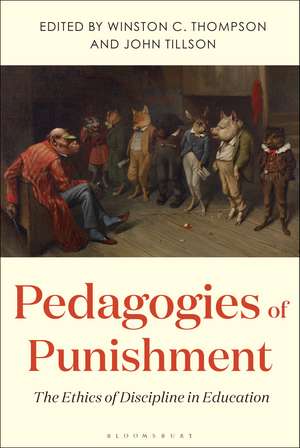Pedagogies of Punishment: The Ethics of Discipline in Education
Editat de Winston C. Thompson, John Tillsonen Limba Engleză Hardback – 17 mai 2023
| Toate formatele și edițiile | Preț | Express |
|---|---|---|
| Paperback (1) | 149.02 lei 3-5 săpt. | +30.18 lei 6-10 zile |
| Bloomsbury Publishing – 17 mai 2023 | 149.02 lei 3-5 săpt. | +30.18 lei 6-10 zile |
| Hardback (1) | 408.68 lei 6-8 săpt. | |
| Bloomsbury Publishing – 17 mai 2023 | 408.68 lei 6-8 săpt. |
Preț: 408.68 lei
Preț vechi: 537.10 lei
-24% Nou
Puncte Express: 613
Preț estimativ în valută:
78.21€ • 80.80$ • 65.09£
78.21€ • 80.80$ • 65.09£
Carte tipărită la comandă
Livrare economică 26 martie-09 aprilie
Preluare comenzi: 021 569.72.76
Specificații
ISBN-13: 9781350275706
ISBN-10: 1350275700
Pagini: 288
Dimensiuni: 156 x 234 x 25 mm
Greutate: 0.58 kg
Editura: Bloomsbury Publishing
Colecția Bloomsbury Academic
Locul publicării:London, United Kingdom
ISBN-10: 1350275700
Pagini: 288
Dimensiuni: 156 x 234 x 25 mm
Greutate: 0.58 kg
Editura: Bloomsbury Publishing
Colecția Bloomsbury Academic
Locul publicării:London, United Kingdom
Caracteristici
Addresses the patterns of punishment that are often discriminatory, being disproportionately focused on students of colour and other minoritized identities, and unjust in other ways
Notă biografică
Winston C. Thompson is Associate Professor of Philosophy of Education and Associate Professor of Philosophy (by courtesy) at Ohio State University, USA. He is the Editor of Philosophical Foundations of Education (Bloomsbury, 2022).John Tillson is Senior Lecturer of Philosophy of Education at Liverpool Hope University, UK. He is the author of Children, Religion and the Ethics of Influence (Bloomsbury 2019).
Cuprins
IntroductionPart I: Punishing Children: Foundational Analyses1. Should School Children be Punished?, Joan Goodman (University of Pennsylvania, USA)2. Punishment, Pupils, and School Rules, John Tillson (Liverpool Hope University, UK) and Winston C. Thompson (Ohio State University, USA)3. Responsibility and the Potential Punishment of Children, Larisa Svirsky (Brandeis University, USA)Part II: Punishment in Practice and at the Margins4. Justice for Trans Youth: Imagining Education Without Cisgenderism, Jenna Scaramanga (IOE, UCL's Faculty of Education and Society, University College London, UK)5. Racialized Childhoods, Educational Goods, and "No Excuses" Schools: In Defense of Play and Agency, Abigail Beneke (University of Wisconsin-Madison, USA)6. Punishment in Early Childhood: Do Exclusionary Practices Threaten Children's Moral Rights?, Joy Dangora Erickson (Endicott College, USA)7. A New Look at Shaming in Schools, Clio Stearns (Massachusetts College of Liberal Arts, USA) and Peter Stearns (George Mason University, USA)Part III: Due Process, Standing, and the Authority to Punish8. Due Process: Fairness in Procedure and Substance in the Public Schools, Todd A. DeMitchell (University of New Hampshire, USA)9. Taking Hypocrisy to School, Kartik Upadhyaya (Kings College London, UK) and John Tillson (Liverpool Hope University, UK) 10. The Punitive Classroom: Punishment and Punitive Feelings Between Adults and Children, Ruth Cigman (IOE, UCL's Faculty of Education and Society, University College London, UK)Part IV: Exploring Alternatives to Punishment11. What We Talk About When We Talk About Punishments and Consequences, Avi Mintz (Newlane University, USA)12. Praise and Positive Behavior Management, Zoë A.Johnson King (University of Southern California, USA)13. Nudging School Discipline, Viktor Ivankovic (Institute of Philosophy, Zagreb, Croatia)14. Making Sense of Student (Mis)behavior: A Critical Pragmatist Alternative to Pedagogies of Punishment, Barbara S. Stengel, Elizabeth A. Self and Rebecca A. Peterson (Vanderbilt University, USA)List of ContributorsIndex
Recenzii
Punishment of students is a fact of school life. Should it be? If so, what forms of punishment are justified and under what conditions? In this superb, edited book, Thompson and Tillson bring together noted philosophers and teacher educators for a comprehensive and definitive response to those questions.
What punishment is and when and how it is justified in education are underexplored topics. This book dives deep into theories and practices of punishment in education, illuminating conceptual complexities as well as intended and unintended impacts of punishment on diverse young people. The book is foundational for understanding punishment in education from analytic and practical views.
There's a rich literature on the justification of punishment, but its routine use by schools is unquestioned. This rich volume presents a persuasive case for thinking that schools can only fulfil their educational mission if their punishments are justified. Philosophers, educationalists and everyone who cares about children will find it illuminating.
This collection of interdisciplinary literature is an insightful contribution to education fields and provides a valuable resource for educators, families, and communities.
What punishment is and when and how it is justified in education are underexplored topics. This book dives deep into theories and practices of punishment in education, illuminating conceptual complexities as well as intended and unintended impacts of punishment on diverse young people. The book is foundational for understanding punishment in education from analytic and practical views.
There's a rich literature on the justification of punishment, but its routine use by schools is unquestioned. This rich volume presents a persuasive case for thinking that schools can only fulfil their educational mission if their punishments are justified. Philosophers, educationalists and everyone who cares about children will find it illuminating.
This collection of interdisciplinary literature is an insightful contribution to education fields and provides a valuable resource for educators, families, and communities.
